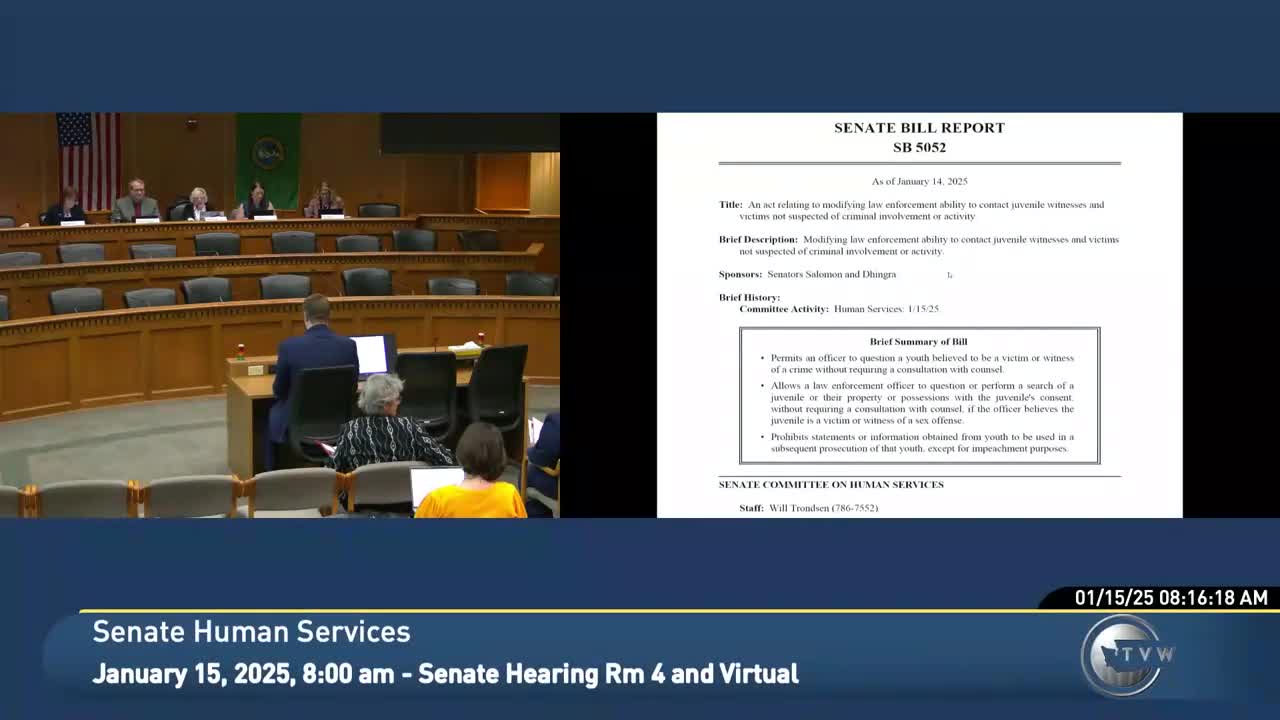Bill clarifies when officers may question juvenile victims or witnesses without youth-access consultation
Get AI-powered insights, summaries, and transcripts
Subscribe
Summary
Senate Bill 5052 would clarify when law enforcement may question juvenile victims or witnesses without a youth-access-to-counsel consultation, while preventing statements obtained in that fashion from being used in the state's case-in-chief against the youth.
Senate Bill 5052, carried by Senator Solomon, would amend the state’s youth-access-to-counsel statute to clarify when law enforcement officers may question juvenile victims or witnesses without first providing access to counsel via the existing youth-access consultation line. The bill would permit questioning and consented searches of juvenile victims or witnesses in specified serious-offense cases without a youth consultation; any information obtained could not be used in the state’s case-in-chief against that juvenile in a later prosecution, though it could be used for impeachment.
During sponsor remarks, Senator Solomon said the intent is to enable investigators to gather information from juvenile victims and witnesses in trafficking or serious-crime situations without undermining the youth-protection purpose of the statute. “This bill is trying to walk a tightrope where we want to make sure that children that are being trafficked or becoming victims of serious crimes can share information with police officers so that they can use that information to prosecute a suspect,” Solomon said, adding the change is narrowly focused and that she is open to technical fixes.
Testimony at the hearing showed a split among stakeholders. Council Member Rob Sacca of the Seattle City Council, whose district includes the 2024 homicide of a 15-year-old victim he described to the committee, urged support for the bill and said investigators encountered practical obstacles interpreting the current statute in that case. Sacca argued clearer authority to question juvenile victims and witnesses in some circumstances could help families seeking answers.
Prosecutors and many law enforcement groups expressed conditional support for clarification but asked for language changes. Laura Harmon, a King County prosecutor, recommended expanding the bill beyond a narrow list of enumerated felony categories because prosecutors see juvenile victims and witnesses across a variety of serious offenses. The Washington Association of Prosecuting Attorneys said it supports clarity that allows lawful questioning with guidelines and protections, or, alternatively, suggested limiting any statutory change to statements obtained from suspects rather than witnesses.
Defense attorneys and juvenile-defense advocates opposed the bill in its current form. Emily Gause, a criminal defense attorney, said the statute was enacted because juveniles often lack the capacity to understand waivers of constitutional protections and remain susceptible to pressure; she and the Office of Public Defense (which has a neutral stance) warned against eroding access to counsel. Liz Mustin of the Office of Public Defense told the committee the youth-access line answers calls statewide and that consultations are typically answered quickly — 95% of calls are answered in under two minutes — and that victim/witness calls have been a small share of total consultations (about 21 calls in the latest full year).
Family testimony was emotional and central to the hearing. Leila Adam, sister of a slain teenage victim whose case has drawn public attention, said investigators did not interview the teenagers who were present at the scene because of current statutory protections and that the family has not received crucial information in the case. Her testimony underscored the political and human stakes behind the bill’s tradeoffs.
Committee members asked for additional technical work to reconcile competing concerns about children's access to counsel, investigative effectiveness, admissibility rules, and law enforcement training. The Washington Council of Police and Sheriffs and several city law enforcement representatives said they were willing to work with the sponsor and stakeholders on precise language.
No final committee action was taken at the hearing; staff and stakeholders signaled willingness to negotiate technical amendments.
